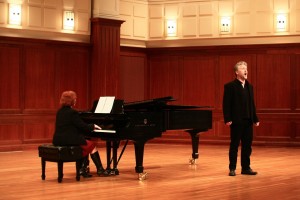By Novera Shahid
Correspondent

Despite a sparse turnout, the Boheme Opera N.J. presented a breathtaking preview of their upcoming College performance “The Magic Flute” in the Mildred & Ernets E. Mayo Concert Hall on Friday, April 13 during last week’s Brown Bag Series.
Joseph R. Pucciatti, co-founder of Boheme Opera, emphasized that Mozart, who composed the opera, created an inspired spectacle that could not be identified under one specific theme. The opera is a fairytale just as much as it is a political statement — the magical elements evoke a thrill of fantasy and adventure.
The opera’s original production was in 1791, during the French Revolution when the idea of popular sovereignty was at its height.
The first excerpt given was an abbreviated overture performed by Sandra Milstein-Pucciatti, co-founder of Boheme Opera. This was followed by a brief sample of the three chords that appear throughout the opera.
Pucciatti introduced the character of Papageno, who goes on an adventure with another character, Tamino.
Baritone Kenneth Overton provided an astounding impression of Papageno as he sang Papageno’s first aria. As he performed, his hands accentuated parts of the piano accompaniment and his eyes deliberately shifted around the hall.
Because this excerpt had been performed in English and not in the expected German language, Pucciatti revealed that the opera had been translated.
“We want to make opera accessible to everyone — new and old,” he said. “We will be doing the show in English.”
Pucciatti also gave the audience a basic sense of the format, explaining, “The opera has spoken dialogue with songs implanted throughout the piece.”
Pucciatti then shared more details about Tamino— who travels far to save Pamina, the daughter of the Queen of the Night. Tenor James Price — who played Tamino — provided another beautiful excerpt by singing the first part of the aria.
Lorraine Ernest — who played the Queen of the Night — gave a striking performance of the next aria — commonly known as the “vengeance aria.”
Widely recognized for this role that requires such a demanding vocal range, she flawlessly reached each octave with arms raised in passion. Her voice and physical presence became one.
Non-music majors seemed interested in the appeal of a more familiar, English-translated opera.






